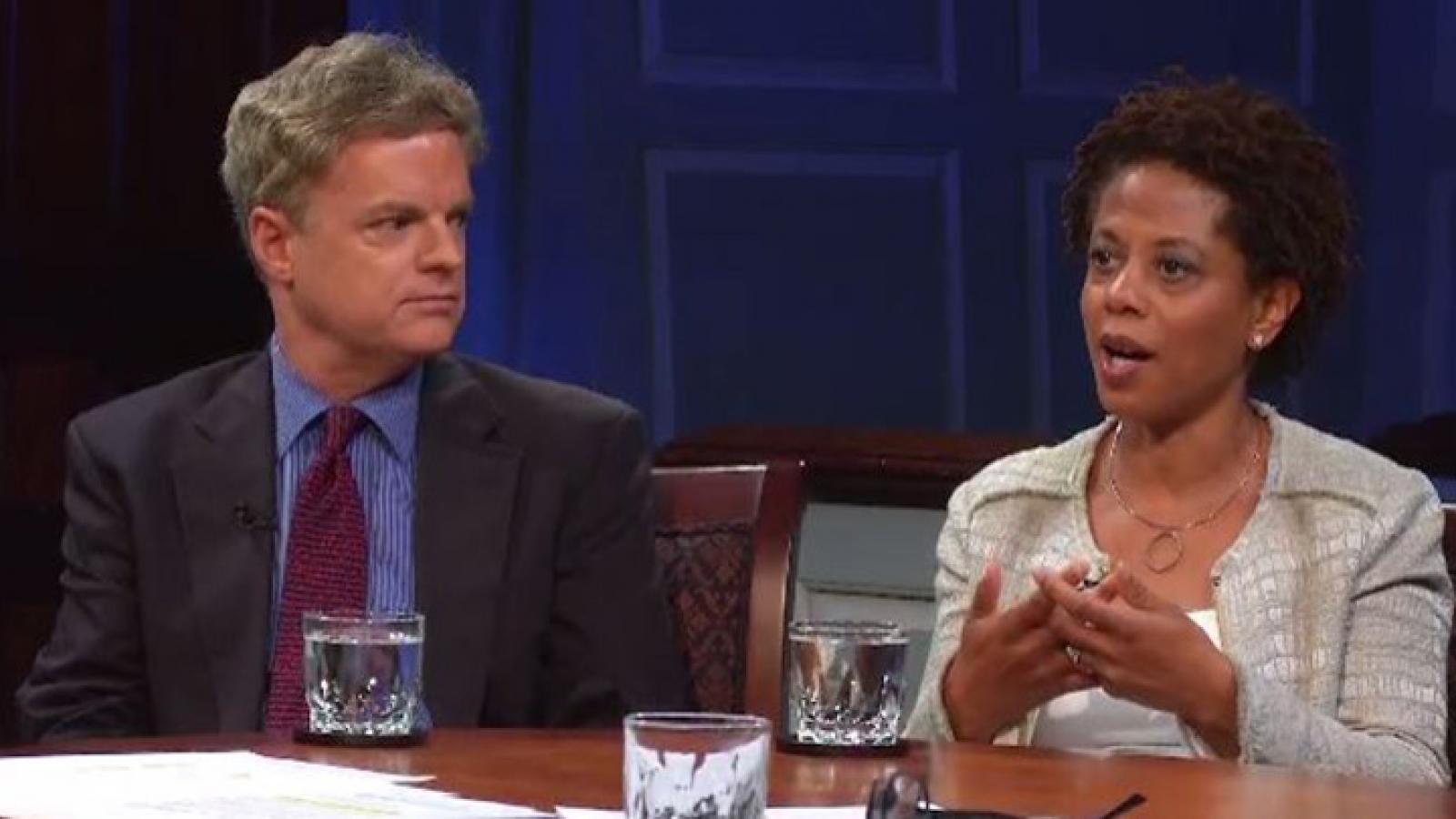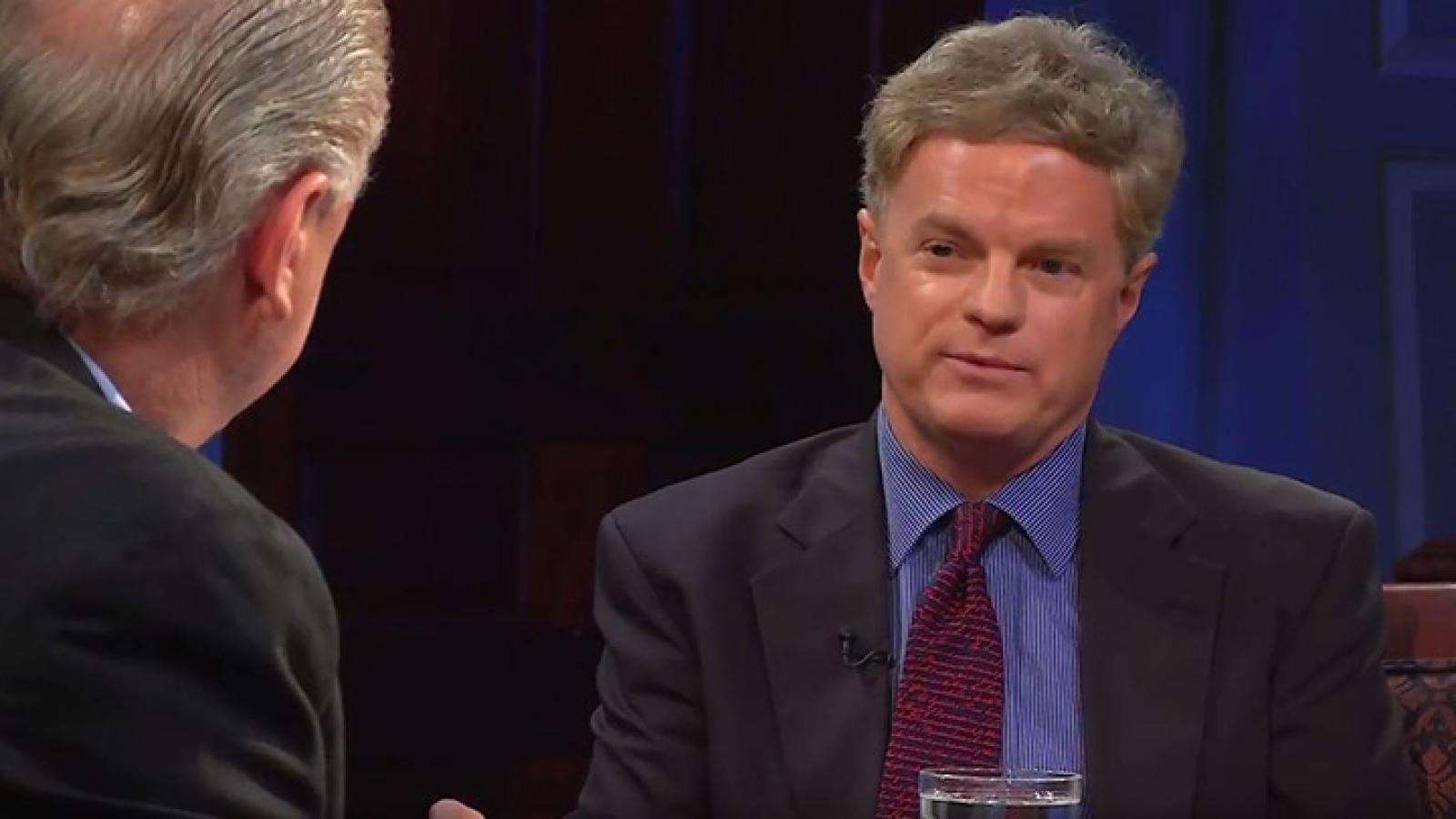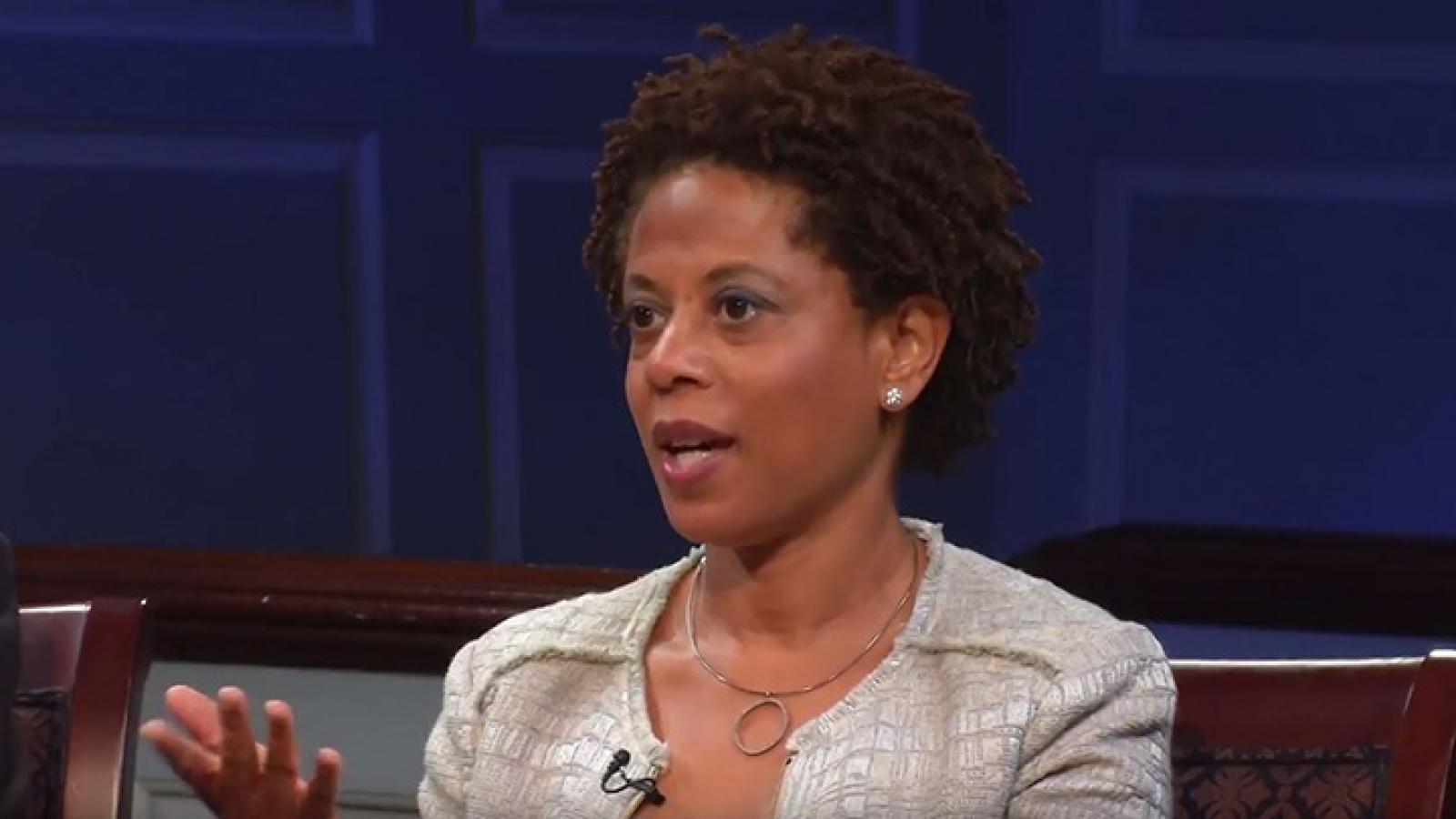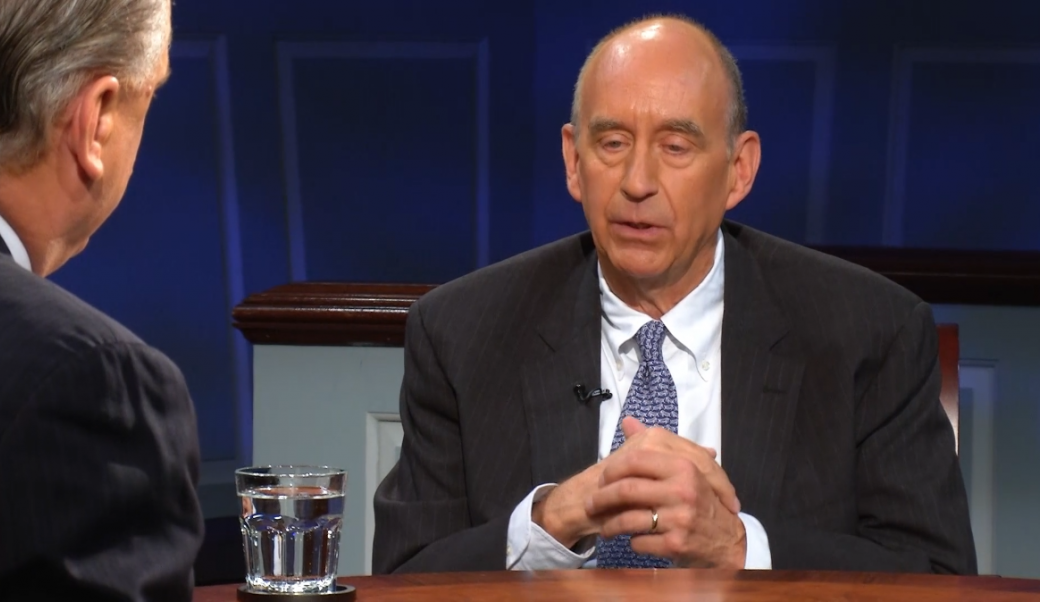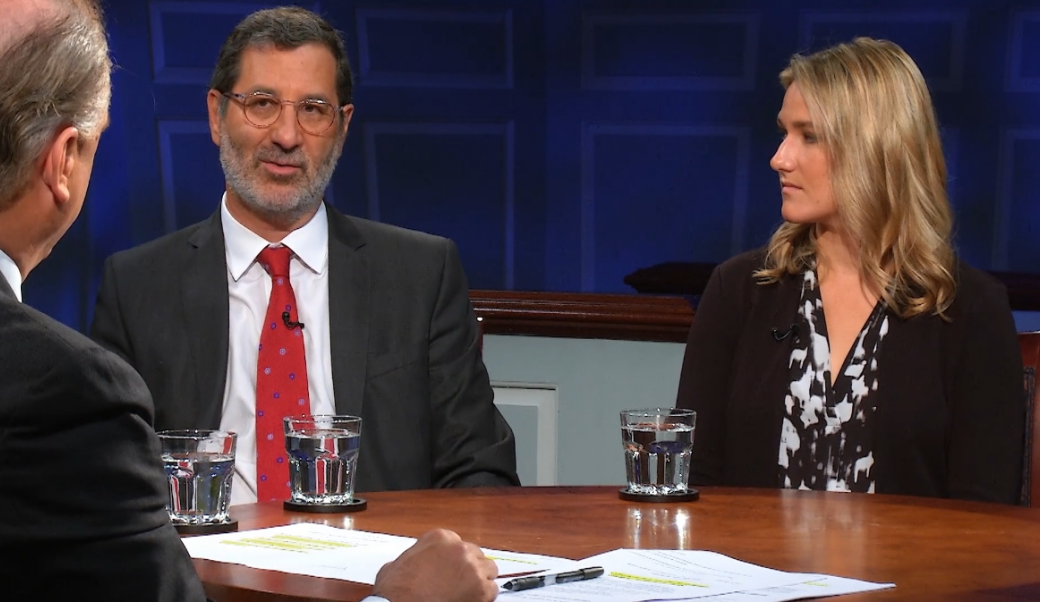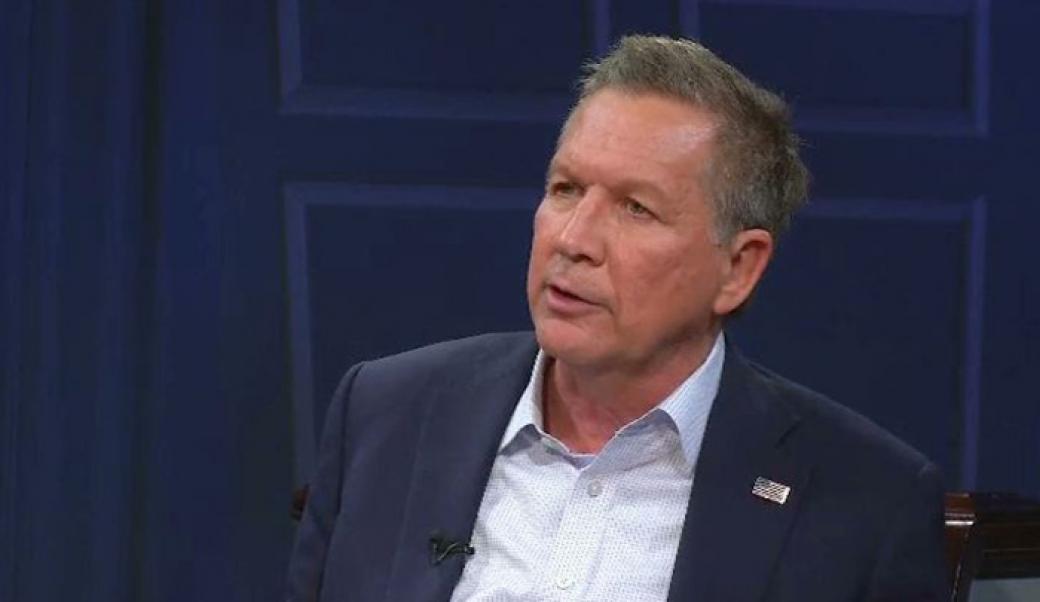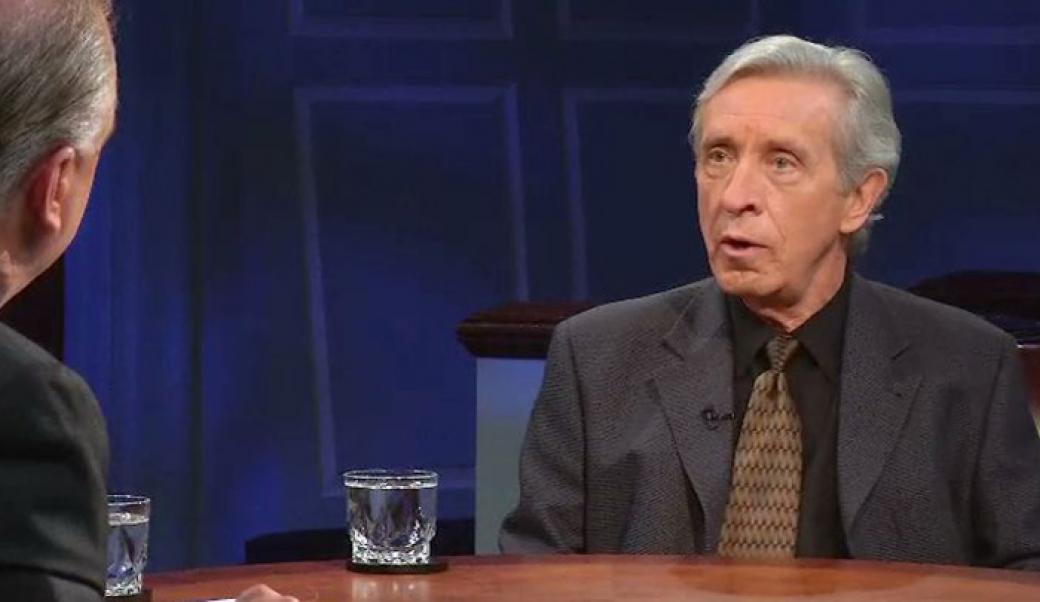About this episode
October 21, 2016
Melody Barnes and John Bridgeland
We explore the challenge of gridlock with the help of two former domestic policy directors. John Bridgeland was an assistant to the president, director of USA Freedom Corps and director of the White House Domestic Policy Council during the George W. Bush administration. Melody Barnes was an assistant to the president and director of the White House Domestic Policy Council during most of the first term of President Obama.
The Presidency
The next president and gridlock
Transcript
Doug Blackmon: Welcome back to American Forum. Doug Blackmon. For most of the past two decades a great paradox of national leadership has grown larger and larger for America. On one hand the U.S. has been consistently been, among all nations, the most forceful and consequential actor in the world. And on the other hand, back at home, grown progressively more and more ungovernable. As we approach the next presidential election one could easily wonder whether the outcome really matters very much. If the White House remains in Democratic hands in one or both Houses of Congress continue to be controlled by the Republicans, is there any reason to imagine an end to legislative gridlock in Washington? And even if Donald Trump becomes president and the Republicans retain both the House and the Senate will the deep and bitter division among conservatives also continue to paralyze any serious government response to the major domestic issues of our time? Underemployment, education, the climate debate, health care, taxes, immigration.
FACTOID: Only 44 percent of Americans have faith in government on domestic issues
Can government start moving again in this era of spectacularly bitter political division?
FACTOID: The Question: Can the next president break political gridlock?
So today we’re turning to two former domestic policy directors. One who worked for President George W. Bush and the other for his successor President Barack Obama. And both of whom in their private and professional lives advocated, at least in concept, for collaboration across ideological divides and deep citizen participation in our democracy. In the first years of the Bush administration John Bridgeland, was an assistant to the president director of U.S.A. Freedom Corp and director of the White House Domestic Policy Council. Today he is president and CEO of Civic Enterprises a public policy firm. He is also the author of the book Heart of the Nation: Volunteering and America’s Civic Spirit. Melody Barnes was assistant to the president and director of the White House Domestic Policy Council during most of the first term of President Obama. Today she has her own domestic strategy firm MB Squared Solutions and is a vice provost at New York University. As part of the Miller Center’s initiative on the first year of the next presidency, she also recently authored an essay outlining her recommendations for how, whether it’s Hillary Clinton or Donald Trump, the next president will restore confidence in the American dream. Thank you for joining us.
John Bridgeland: It’s nice to be with you.
Melody Barnes: Thank you.
Blackmon: What’s the obligation of the opposition to, or is there an obligation, at some point to, in effect, allow a president to achieve some portion of their agenda based on the, at least some degree of mandate that they received by the people by becoming president?
Bridgeland: So I think it starts with the president as the elected leader in setting a tone, a spirit of inclusion, around big ideas that um all sides can see, can address some of our most serious challenges. You know, we had some successes; we also had a lot, made a lot of mistakes. But one of the things we did well early on is actually bring Democrats, Senator Kennedy, Congressman Miller, others into the discussion around how do we boost educational outcomes for children who are uh, vulnerable or from low-income families, or living in neighborhoods of endemic poverty. And by creating the spirit of inclusion and actually listening to what mattered to them, um we came to a shared vision and it resulted in the passage of landmark legislation that had good impacts on many fronts.
FACTOID: Black children are four times more likely as whites to live in poverty
Blackmon: And so, but how would you translate now, I think that one would say that the current environment is different than that one, and the criticism of Republicans in recent times has been that, has been an unwillingness on the part of congressional Republicans to take, to take the hand similar to the one that your White House offered to Democrats, and a hand that was taken. Is that a fair criticism?
Bridgeland: Well I think, you know, there’s responsibility on both sides and I think that one, the power of good ideas attracts anyone, or ought to attract anyone. The power of evidence and showing that these are real solutions that could solve problems and not just through government, by the way, but by engaging the institutions of civil society, engaging citizens um in addressing these issues. And so I think the challenge for this next president first, is actually to articulate a vision for where he or she wants to take the country.
Blackmon: And Melody, you in the essay you wrote as part of this first year initiative, you talked about the new president having some very specific legislative actions to take right off the bat, executive order on the first day, a comprehensive piece of legislation that speaks to some of these issues. But you also describe some of that as being, um very practical steps, and somewhat modest in some regards and things that both parties could, could embrace. That sounds a lot like what John was just describing, is it the same idea? And, and I also want to go back and hear your sense of how things went in your time in the White House as well.
Barnes: You talked about the hand that President Bush extended and at the time I was working for Senator Kennedy, the hand that Senator Kennedy also extended, so they met somewhere in the middle because they both arrived or were in Washington to govern. And I think that is actually fundamental to this issue and people on both sides of the aisle have to determine that they are there to get something done, and the responsibility, and I think this goes to your question, is to the people and the country. That you can’t just retreat to corners when there are people counting on you to solve these big problems.
FACTOID: 63 percent of registered voters not satisfied with candidates’ choices
And certainly the problems, some of them that John was articulating, around a mobility and opportunity agenda, around the crumbling infrastructure in the country, I mean we can tick through a list of things, have to be solved if the nation is going to move forward and if we are going to heal some of the wounds that are festering and um, bleeding right now. Um and I think right now there exists in the country, a mood among some that says that’s not our responsibility. In fact, we are here not to govern, we are here to shut down, and the calcification that exists is something that we consider to be an achievement. And I think both the American population and those that they send to Washington have to come to an agreement about what it is that we want from our federal government in this instance, but also on the state and local levels, so I think that that is important. The kinds of things that I talk about in the article, um go to the fact that because of the calcification, because of this sense that we can’t get anything done, the frustration, the anger that exists in the country right now about circumstances as well as towards Washington, require that we start to put some wins on the table, that the American people need to understand that our federal government can work, that federal government is not the problem, that we need an efficient government that can work with other sectors to help solve some of these problems. And some of the things I think about and I think that others are thinking about, and hopefully transition teams are thinking about right now, speak to addressing some of these challenges, and literally both as process and as substance, moving the ball forward.
Blackmon: These days I think if either side takes a position on a particular policy and how it turned out, the other side would almost certainly dispute whatever that is, no matter how mathematical or empirical it may be, we can’t agree on things like whether the president, until very recently, whether the president was born in the United States. You know, we—the—there’s a willingness to traffic in things that are so obviously and clearly false and, but the problem is that the ones that are easy to identify as false are one thing, but did a policy really work? Did a policy really work, well do we really trust who did the calculations, do we trust who brought the data in? Those are these—we live in this time where we can’t agree on even the most basic measures of things. So is it—can we really get over that?
Bridgeland: Daniel Patrick Moynihan famously said “facts are stubborn things”. And I have found—I had to testify before a committee of Congress and usually you testify and nobody really shows up and there’s not all that much interest, to be honest. This one everybody came and people on my side of the aisle, Republicans who didn’t like food stamps, the SNAP program today, learned that there had been this longitudinal study that young people that were on SNAP actually had an 18 percent increase in high school graduation rates. I had members from the Republican side come up to me afterward and say you know I’ve always opposed SNAP, but that’s a really good study and you’re now showing me that it’s not just about people going through the same food line and often unnutritious food but nutritious food and like real outcomes that lead to productive work and—um I’ve got a new view of it now. So I think Melody’s right, we’ve got to bring this idea—bring money ball to government, data driven policy making to government, and there’s a wonderful effort Results for America, which has brought together Republicans and Democrats from both sides of the aisle, from budget directors to policy makers, to embrace this idea—and I think evidence has a way of cutting through the ideology because ultimately facts are stubborn things.
FACTOID: 82 percent of U.S. high school students now graduate—a record high
Barnes: I think and I’m curious what you feel, how you feel about this Bridge? I worked in Washington for over 20 years. And one of the things that I recognized in the pieces of legislation I literally started working on in 1996 that President Obama signed into law, and that you often have to take the long view. And I know that can be unsatisfying. I know that that can be frustrating. And I can tell you as the person, the staff person working on those pieces of legislation that it was absolutely frustrating. But policies are often a lagging indicator. And as Senator Kennedy often used to say to me, and he would do this, and the process is chemical and you have to wait for that moment and be prepared for that moment where the door may have closed a year ago, but the window has opened today. And all of the work that is being done seeds the ground and makes the ground more fertile and helps create that opportunity. So around issues on mass incarceration for example. There is a growing bipartisan caucus.
FACTOID: Estimates show one in three black men are likely to serve time in prison
There are those that are in the faith community, those who are in the private sector, staunch, staunch conservatives along with the most progressive liberals who share a view that this is something that we have to work toward. I believe strongly that the moment will come that that window will open that we can move through it and we can help address these issues. Happen as quickly as it should? No. Happen when we want it? Absolutely not. But will it happen? I do believe it will happen but the policy wheels are turning and grinding slowly as they often do. And I think that you know the president has often received criticism for being you know Pollyanna because he was so willing to try to be bipartisan, putting bipartisan elements into the ACA and into the health reform plan and all the way to being considered one of the most uncooperative individuals ever to inhabit the Oval Office. And neither of those things is true. I mean this is a president who continues to believe in the essence and the importance of bipartisanship but at the same time has recognizes that he has to thread that needle very carefully, because often that hand that was extended wasn’t returned. So what other tools can be used to try advance the agenda? Or how can I help create that fertile ground so that at some point we will be able to move the legislative agenda forward on a particular issue?
Bridgeland: I think Mel has said it beautifully. You know just on criminal justice reform, the speaker of the house has endorsed bills introduced by Democrats. Um, Newt Gingrich the former speaker convened a fabulous meeting on criminal justice reform a few years ago. Lots of Republicans embracing this idea of you know, having millions of young people locked up for non-violent drug offenses didn’t make sense, All the lost potential human capital productivity, all the reasons that are marshaled. But I think we do have to take the longer view. I worked on National Service for many years and the Bush administration we grew opportunities for Americans to serve after 9/11. But it wasn’t until the Edward M. Kennedy Server of America act so named by conservative Republican Orrin Hatch who had a 32-year friendship with Senator Kennedy that um all these things we fought so hard for in the Busch administration came to pass in the first 100 days of the Obama administration. So patience [haha] is clearly the watchword and laying the groundwork for that moment when you can spark. And you have to be ready when it comes. And I think Mel says it exactly right.
Blackmon: Another dilemma that faces whoever the next president is the idea that the problem is the government and that everything the government undertakes by definition should first be perceived as a likely problem. And so how does a reasonable Republican, if that’s a reasonable term, how does someone like you, can you be a voice for that that actually goes out there and says look the government is in fact not the problem always?
Bridgeland: President Bush’s philosophy that I share was that government should be limited, in part because we want active citizens, active civil society. It’s my strong belief that uh, meeting the needs of people across the country, somebody that knows your name, shares your zip code, lives in your area, is working through institutions that you are also a part of or ought to be part of are better equipped and better positioned to make a difference in your life than a distant government bureaucrat. Having said that, government is so in so many areas, in terms of food safety, environmental protection, national security, homeland security, education policy appropriately, but it needs to be limited government but in the areas which is operates, effective government.
FACTOID: 71 percent of Americans believe their local government works well
Barnes: And the president would say this, President Obama, that the people would be surprised if they understood that I don’t believe that for every problem there is a government solution. And government probably larger than you know President Bush, would have articulated but President Obama also believed that we needed an effective efficient government. And that was the filter. And as a result, he also believed that not every problem would be solved out of Washington, DC. and as a result, he charged us to look in the states, to look in local communities, and to identify the solutions to the complex social problems that are facing our country today. And in fact, we formed a council, a White House council for community solutions that Bridge sat on among others, other Republicans, Democrats, private sector, philanthropic, not-for-profit leaders to examine why are certain communities really successful in taking on these challenges? What is it that they are doing? And we started to better understand that and ultimately started to articulate along with others at the same time the strategy around collective impact. To look at a particular set of big challenges and the application of that strategy to those challenges, and all of that required cross-sector collaboration. And that’s when you get people exercising the muscles that are strongest for them and coming together in a way that can help us to solve the problems. It doesn’t mean, and we have to I believe we have to deal with this problem of government is bad and government is inherently flawed because it is, but look at how do we make it most effective, most efficient, and the best partner with other sectors in solving these big problems.
Bridgeland: Abraham Lincoln said the purpose of government to do that for the people which they otherwise couldn’t do for themselves. And when you look at sort of the big ideas that have emerged, where ultimately you needed a national system to embrace it. The national park idea, America’s best idea, emerged from private citizens. John Muir and others that saw the power on the heels of our manifest destiny of protecting places, a great democratic idea that we would own these places. Over and over civil rights movements, great social movements in the country again merge from private citizens who sometimes didn’t have any public platform at all. But then through their power and persuasion got government to step up and do the right thing.
Blackmon: Do both of you support the nominee of your party?
Barnes: I support the nominee of my party.
Blackmon: Do you John?
Bridgeland: I don't.
Blackmon: You don't. Um I thought that part of the case but I wanted to have you say it, not me. Umm the if we look at the potential outcomes to as I introduced in the beginning of our conversation, in any scenario in which Donald Trump becomes president of the United States, is any of this conversation that we've had relevant to to that scenario I mean is there a way to uh to take the sort of wise council that you've tried to offer here. Is there a way that comes to bear in meaningful ways in a Trump presidency?
Bridgeland: Well I think the the president has to reflect the American people. And once you're president, uh you move beyond the campaign and politics and divisiveness and it's your obligation to unite people and parties across uh common solutions. And I think there's so much bipartisan momentum to address our uh opportunity gap, uh reform our criminal justice system, insure young people whether their black, white, poor, rich, middle income have equality of opportunity. I mean that's defined us since the beginning. Um our country's apart in places like Ferguson and Baltimore and Chicago. Umm it's the obligation of the president, all our political leaders, to umm offer solutions they can help bring us back together and uh provide those opportunities. So absolutely. Whoever is elected, if its Donald Trump, umm he has that responsibility, if its Hillary Clinton, and we can’t we can’t just leave the burden on the president, we all have to be active in our own communities and neighborhoods and lives and through the institutions in which we work uh to be part of the solution.
Blackmon: Melody, how do you see the role of the opposition whatever that is, whether that's obviously that's the Democrats, maybe that's also some Republicans, uh in the in the scenario of a Trump presidency?
Barnes: Well I I think where there are opportunities to move forward we have to take those opportunities as we were saying at the top of the conversation for the good of the country um at the same time, where there are significant differences that go to the very principle's and not of the party but of the country um and chief among them how do we heal some of the rifts and the wounds as we were just discussing that have contributed to some of the significant mobility, opportunity, incarceration, those challenges that we're facing that we have to stand for that. But at the same time, we have to help move the entire nation forward. I mean the debate that we're having the divisiveness, the anger, the friction that we're having um I think reflect the fact that we haven't and I'm hesitating to use this word, we haven't had the kinds of conversations, I hate this national conversation on race um language because it’s not going to be a conversation somewhere on television
Blackmon: And we've had a bunch of them and they didn't really go anywhere.
Barnes: Yeah, you know um, but we're going to have to find a way that people understand that we are in this together that our humanity and our needs tell us that we have so much more in common, um historically we look back and we find over and over again this wedge that's been driven between people who are poor you know African American and white and Latino and Asian and Native American um that these wedges have driven them us apart when, in fact, we have common interests that combined and with civic voice we can move legislators to start to address.
Blackmon: Uh let's say Hillary Clinton is the next president, she's just been inaugurated and you get a phone call that says Hillary would like to sit and talk with you for a few minutes, she wants to hear from a reasonable Republican whose been in this role in the White House before and you have a few minutes to speak to new President Clinton. What's the main thing you want to convey to Hillary Clinton in that conversation?
Bridgeland: Thank you for calling, thank you for being inclusive, um keep this spirit throughout your term um do it with members of Congress, do it with governors, um articulate a vision for the country, be clear on your priorities in the first term, be active on all the issues you talked about on the campaign throughout your term and America needs a big idea, which is, um I think we actually need large-scale civilian national service, that would awaken an 18 to 28 year olds a year of service together uh across race, income, geographies, um political affiliations, religious affiliations. Working together in our communities in common purpose.
Blackmon: President Trump gives you the same call Melody, what's your response?
Barnes: Um, I would say a couple of things, one that running, that policy making is its own art and science. Umm there is a discipline to it that should be respected. And that there are a host of people out there that have been doing it and doing it well for quite some time. To embrace them, to learn from them. It is not like just running a great big business. It is many ways more complicated than that, requires a lot more compromise than that. Umm I would also say that as now the president of the entire United States and of all the people, umm much of of what Bridge has articulated around the importance of recognizing that you have a responsibility to the entire country to lead. That much of what has been couched as political correctness or “telling it like it is” um has in fact helped to further drive people apart and is leaving a stench across the nation that will make it more difficult for us to work together. And I would implore him um to engage in communities where he is not engaged before um to learn and to understand the challenges that are faced there and to look for a path forward um understanding in fact the the beauty of our democracy and our republic of how we can move forward um in a way that's responsible, while he can hold onto his values and respect those of the opposition as well.
Blackmon: These are remarkable days ahead wherever we go. John Bridgeland, Melody Barnes thank you both for being here.
Bridgeland: Thank you.
Barnes: Thank you.
Blackmon: Don’t let this episode be the end of this conversation. We hope our viewers will keep talking about these things. Keep looking for meaningful ways to bridge our political divides with your neighbors, your families, your political enemies, maybe even tell your elected representatives that it’s time to make things work again one way or another. You can also join our conversation at the Miller Center Facebook page or by following us on Twitter. My handle is @douglasblackmon. To watch this and other episodes of American Forum, download podcasts or read transcripts of these conversations or to learn about the First Year Initiative, visit us at millercenter.org/americanforum. I’m Doug Blackmon. See you again next week.
